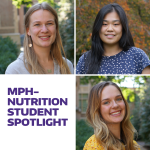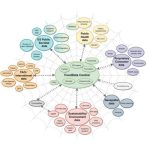Research & Practice
March 14, 2024
Public health nutrition student practicums support city and state health initiatives

In recognition of National Nutrition Month®, we spotlight three Master of Public Health in Public Health Nutrition (MPH-Nutrition) students in the University of Washington School of Public Health who are working on local initiatives and programs in winter internships that relate to food security, food access, community health, and food sovereignty. MPH-Nutrition second year students…
October 11, 2023
New paper illustrates complexity of food systems data and how to close gaps

How do we support and transform sustainable food systems while maintaining and improving the nutritional status of the population? This question has become a global public health priority for international organizations, funders, academics, and policymakers. Because food systems data are so transdisciplinary and intersect many domains such as health, nutrition, economics, society, and environment, creating…
June 27, 2023
The Regenerative Power of Seaweed in Soil Fertility and Human Health
The purpose of this research was to examine seaweed/kelp from indigenous and food systems, nutrition, and health perspectives. Interviews and academic research were evaluated to give context to seaweed’s importance in ecosystem and soil health, sustainability, local food systems, and dietetics.
June 26, 2023
Investigation of the Correlation Between Food Science and Oral Health
The purpose of this internship was to investigate the bidirectional relationship between nutritional and oral health by critically examining information gained through clinical observations, the results of patient dietary interviews, and access to patient demographic data. Community Partner: Bellevue Dental Oasis
Exploration of the Association Between Family Eating Habits in Adolescence and Intuitive Eating in Young Adulthood
This research explores and evaluates the relationship between college students’ current level of intuitive eating and their parents’ or primary caregivers’ feeding style during the students’ adolescence.
Differences in state-level accessibility to the Supplemental Nutrition Assistance Program (SNAP)
Collected and recorded 2023 data from all 50 U.S. states to compare SNAP policy choices from past USDA data. This will show state-level trends, eligibility criteria, and participant requirements.
June 13, 2023
Evaluating the Impact of Changes in the Service Delivery of WIC and First Steps in King County
Worked with Parent-Child Health Programs to design, conduct, and analyze semi-structured, qualitative interviews with clients of the First Steps and WIC program. Conducted 27 interviews across six different WIC/First Steps clinic locations in King County, did a thematic analysis of the transcripts to highlight key themes, and presented recommendations to Public Health Seattle King County…
June 12, 2023
Assessment and Evaluation of an Interprofessional Practice Education Event for Students of the UW Graduate Coordinated Program in Dietetics and School of Pharmacy Program
Assessed and evaluated student participation in and feedback of an Interprofessional Practice Education (IPE) event with UW graduate students from the Graduate Coordinated Program in Dietetics and School of Pharmacy. Community Partners: UW Graduate Coordinated Program in Dietetics and UW School of Pharmacy
SCH Celiac Disease Program: Assessing Equity & Strengthening Resources
Completed a needs assessment of the program to learn how it could be more equitable for family participants. Provided an enhanced Celiac Program resource guide and updated patient enrollment listing, prepared a comparison map revealing mismatches in resources and patient location, designed a patient needs survey, and gave a final presentation to program staff with…
Nutritional Assessment and Training of Latinx Parents of the Elementary School Program at El Centro de La Raza
Assessed both the health and nutrition knowledge and the training on nutrition to Latina/o parents of students in El Centro de la Raza’s Elementary School Program. The aim of this project is to strengthen a) the skill of developing effective assessment tools to gather diet and nutrition data, b) the ability to communicate audience-appropriate health…
Previous page Next page